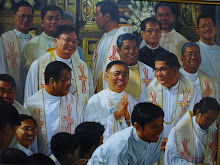
As individuals and as families, we have our ups and downs. We pass through various “seasons of our lives.” Some days can be sunny and bright; others may be dark and dreary. Whatever type of day comes our way, whatever reaction one might have to sun or shade, there is one thing we can be sure of. Life goes on. And the coming of a new day and whatever surprises it brings, is never dependent on our expectations and wishes, our inner disposition, and our worthiness or unworthiness.
Into everyone’s life, some rain has to – and does – fall! This seems to be what Job is acknowledging matter-of-factly. He compares himself to “a slave who longs for the shade, a hireling who waits for his wages” (Job 7:2). Never at a loss for words to describe his misery, Job more than aptly stands for a great many of us who may be undergoing their own share of “sweat and care and cumber; sorrows passing number.” Job tells a story that sounds all too familiar to many of us. They are stories that, as a priest, I have been privileged to listen to, and empathize with, over the many years I have been journeying with others in faith and life. The stories sound so alike and yet so different. They are so alike in the sense that all, bar none, are not immune to suffering and pain. They are so alike, too, in the sense that the pain each one feels is deeply personal and far-ranging in terms of consequences. They are so different in the sense that deep pain can be occasioned by a multiplicity of causes and surrounding circumstances, which are as many and as varied as there are people experiencing them.
There is something in the Liturgy of today for people deep in the throes of suffering. God does not take away the pain, it seems to me. God does not offer to make the pain go away. Not necessarily. But the readings tell us something for sure: God is close to the brokenhearted! God is on the side of those who suffer in any way. God offers a gentle reminder for those in pain: “He heals the brokenhearted and binds up their wounds…the Lord sustains the lowly, the wicked he casts to the ground.” (Ps 147:3,6)
St. Paul stands for this God who is close to the suffering when he also alludes to himself as a slave, willing to go the extra mile and become like others are: “To the weak I became weak, to win over the weak. I have become all things to all, to save at least some” (1 Cor 9:22).
God is indeed close to the suffering. This, Jesus shows in concrete signs in today’s Gospel passage, alleviating the pain of those brought to him, including Simon Peter’s mother-in-law. God shows himself close to and on the side of those who suffer in any way.
But there is yet one thing we can safely deduce from today’s liturgy, which is no less true and no less important than the foregoing. This is the fact that there is something we who suffer can do despite the suffering and the pain: help others in their own pain, that is, become healers though wounded ourselves. This is what Paul did. “All this I do for the sake of the Gospel, so that I too may have a share in it” (1 Cor 9:23). For the sake of the Gospel, Paul became all things to all men, even to the point of calling himself a slave like Job did.
Jesus today even offers a heartwarming example of empathic and active concern for a particular family predicament. He healed Peter’s mother-in-law. In Jesus, God’s solicitude for the suffering took on concrete manifestation. In Paul, the same love for the suffering was shown in his willingness and readiness to walk in other people’s shoes, as it were. In Job, we see God’s long- suffering nature and patience. In him too we see a shining example of humble acceptance and resignation to whatever God allowed him to undergo. Job faced suffering without equal, with nary a passing thought to go against the God he believed in.
Among others, Filipinos still show a lot of this trait extolled by today’s readings. Filipinos are close to those who suffer, to the downtrodden, to those who are considered underdogs. How else explain the popularity of telenovelas, and the propensity of Filipinos to identify with those who suffer unjustly? How else explain the fact that for many families, the knowledge that another family is currently facing some difficult trial or at least needs help, would immediately send lola or nanay to that household to provide some help? In many cases, the person really does not need to do anything, nor give anything. In most cases, the poor who have nothing, are those who really help others just as materially needy as themselves. But they give what no money can really pay for: themselves. Their presence and obvious concern for the needy is more than money can buy. Pakikiramay is the untranslatable word for this Filipino trait that stands so close to the nature of God extolled in today’s liturgy: God is close to the brokenhearted. Wagas ang pakikiramay ng Diyos sa nagdurusa at nagdadalamhati! Praise the Lord, who heals the brokenhearted!


No comments:
Post a Comment